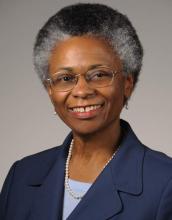
March, 2021
DR. BERNARD'S REFLECTIONS

Marie A. Bernard, MD
Acting Chief Officer for Scientific Workforce Diversity
We often discuss the pathway for career progression of candidates from trainees to post-doctoral researchers to tenured scientists. However, the pathway of individuals from groups underrepresented in science (URGs) has a number of well-documented barriers and multiple access and egress points—in particular, entry and retention in graduation programs, post-doctoral opportunities, and long-term faculty positions. As such, this month’s issue focuses on three pivotal points in the career journey and presents evidence-based strategies for supporting recruitment and retention of URGs throughout their career trajectory. The first article examines academic performance measures during and after Ph.D. completion, while the second article describes a framework for remotely supporting trainees or early-career researchers during the COVID-19 pandemic. The final article describes institutional strategies to increase the entry of students with disabilities into the scientific workforce, a population currently underrepresented in laboratory research in particular.
Re-examining Standard Academic Performance Measures
Performance measures such as Graduate Record Examination (GRE) scores and grade point average (GPA) are frequently used to assess applicants for graduate school admissions. However, research is conflicting on the validity of these performance measures in predicting STEM graduate and post-graduate success, particularly for URGs. Dr. Tremaine B. Williams, Assistant Dean for Recruiting, Diversity, and Retention at the University of Arkansas for Medical Sciences (UAMS) and colleagues sought to examine performance measures of URG students in need of additional training initiatives to assist with completing the UAMS biomedical science degree. This objective ties closely to the work of NIH SWD, and also the recently released NIGMS notice of interest in studies of structural racism in biomedical training.
Dr. Williams’ study used a sample of 37 trainees in the NIH-NIGMS funded Initiative for Maximizing Student Development (IMSD) program at UAMS. IMSD provides additional graduate training for URG students—specifically, a summer transition program, peer mentoring, communication on minority role models, and a biochemistry course based on active learning. The study assessed the effect of three academic performance measures (undergraduate GPA; first-semester graduate GPA; and GRE verbal, quantitative, and writing scores) on academic outcomes. Results showed no significant differences in Ph.D. performance over time between students who received prior training at Historically Black Colleges and Universities (HBCUs) versus Predominately White Institutions (PWIs). HBCU graduates with a lower verbal GRE score had a higher graduate school GPA, while PWI graduates who scored lower on the quantitative section of the GRE had more publications. Study authors concluded that these differential GRE associations indicate that academic admissions should focus less on applicant GRE scores and seek more valid indicators of STEM career success.
Remote Research Mentoring Best Practices
As seen in models such as the IMSD program above, mentoring is critical in sustaining workforce diversity, particularly during crisis situations such as the COVID-19 pandemic. Trainees and early-career investigators currently face challenges due to suspended research operations, laboratory restrictions, and uncertainty around career opportunities such as networking events and conferences. Effective mentoring—even remotely—can help bridge that gap and ensure mentees from all backgrounds feel supported during and after this challenging time.
A new essay published by Dr. Christine Pfund describes a three-step framework that both mentors and mentees can use to sustain remote mentoring relationships and enhance their effectiveness. A critical factor in this framework is consideration not only of mentee’s professional growth, but also their psychosocial needs such as mental health and wellbeing. Dr. Pfund and colleagues drew on evidence from the biomedical workforce to support mentors in establishing a viable remote mentoring plan with their mentee.
Policies Supporting Inclusion for Individuals with Disabilities
Individual-level approaches such as academic support and mentoring are extremely valuable in improving URG recruitment and retention. However, these approaches do not preclude the need for systems and policies promoting inclusion and accessibility in workplaces. A recent commentary published in the Disability and Health Journal discusses crucial barriers to the inclusion of students with disabilities in need of service dogs (SDs) in laboratory settings. Study authors describe that SD policies in academic settings either don’t apply to laboratory settings or focus only on exclusion—for example, excluding SDs from settings where personal protective equipment is required. Insufficient policies result in drastic underrepresentation of individuals with disabilities in the scientific workforce, inhibiting the potential that a diverse workforce can bring to the biomedical enterprise.
The commentary also describes recommended protocols for the inclusion of students with disabilities in need of SDs. For example, individualized risk assessments for all students with disabilities, including those with SDs, to determine reasonable accommodations for their lab and other work settings. Institutions may also define necessary skills for SDs in order to ensure safety measures are met in lab settings. By employing more specific, evidence-based protocols as well as appropriate assessment and accommodations, institutions can ensure that students and other individuals with disabilities are able to reach their fullest scientific potential.
This Month’s Blog Posts
If you have not had an opportunity, please review this month’s blog posts at our website.
- The UNITE Initiative: Charging Forward on the Road to Racial Equity in the Biomedical Workforce
- The Impact of the COVID-19 Pandemic on the Extramural Scientific Workforce – Outcomes from a NIH-led Survey

The links above are pulled from the top news articles trending on the subject of diversity in science and technology.
The stories selected are not a reflection of the views of the National Institutes of Health.

